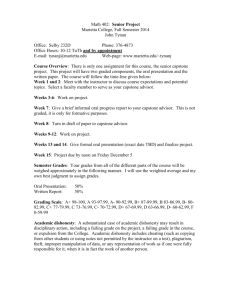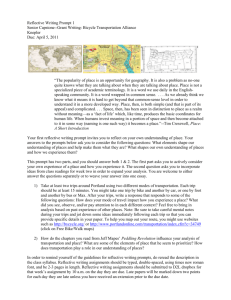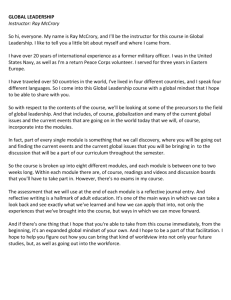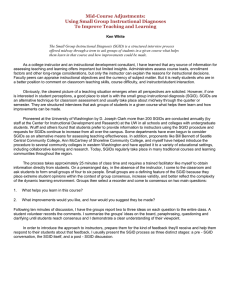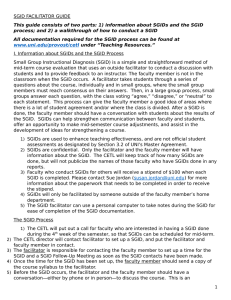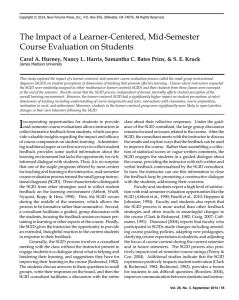Peer Review of Final Projects - University Studies: Senior Capstone
advertisement
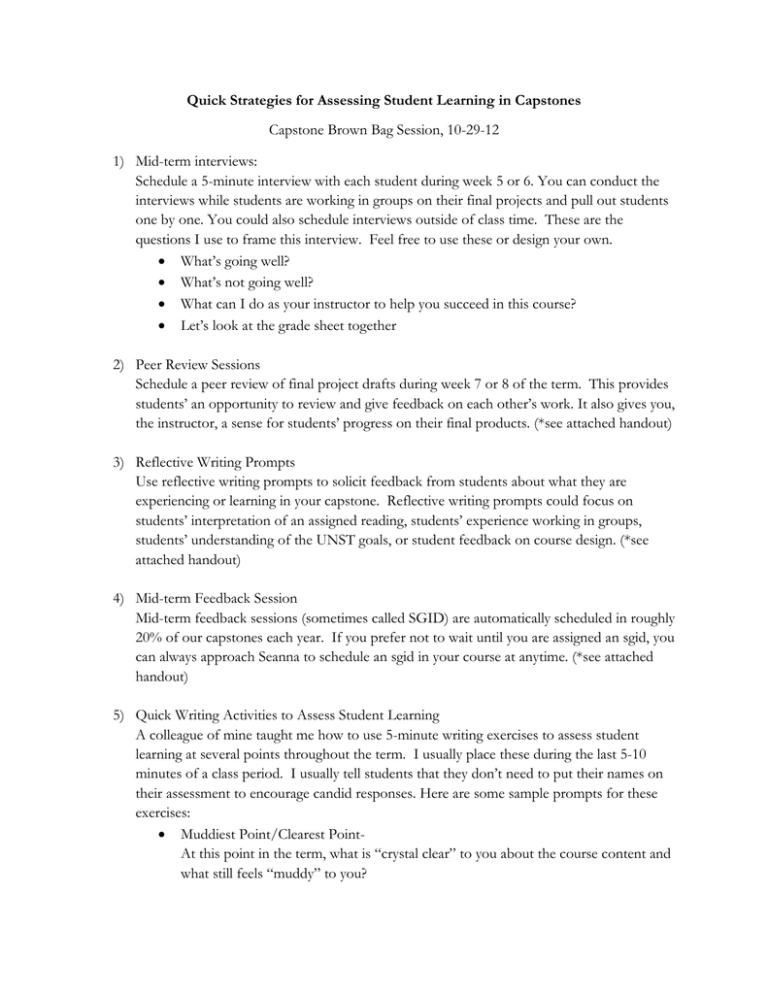
Quick Strategies for Assessing Student Learning in Capstones Capstone Brown Bag Session, 10-29-12 1) Mid-term interviews: Schedule a 5-minute interview with each student during week 5 or 6. You can conduct the interviews while students are working in groups on their final projects and pull out students one by one. You could also schedule interviews outside of class time. These are the questions I use to frame this interview. Feel free to use these or design your own. What’s going well? What’s not going well? What can I do as your instructor to help you succeed in this course? Let’s look at the grade sheet together 2) Peer Review Sessions Schedule a peer review of final project drafts during week 7 or 8 of the term. This provides students’ an opportunity to review and give feedback on each other’s work. It also gives you, the instructor, a sense for students’ progress on their final products. (*see attached handout) 3) Reflective Writing Prompts Use reflective writing prompts to solicit feedback from students about what they are experiencing or learning in your capstone. Reflective writing prompts could focus on students’ interpretation of an assigned reading, students’ experience working in groups, students’ understanding of the UNST goals, or student feedback on course design. (*see attached handout) 4) Mid-term Feedback Session Mid-term feedback sessions (sometimes called SGID) are automatically scheduled in roughly 20% of our capstones each year. If you prefer not to wait until you are assigned an sgid, you can always approach Seanna to schedule an sgid in your course at anytime. (*see attached handout) 5) Quick Writing Activities to Assess Student Learning A colleague of mine taught me how to use 5-minute writing exercises to assess student learning at several points throughout the term. I usually place these during the last 5-10 minutes of a class period. I usually tell students that they don’t need to put their names on their assessment to encourage candid responses. Here are some sample prompts for these exercises: Muddiest Point/Clearest PointAt this point in the term, what is “crystal clear” to you about the course content and what still feels “muddy” to you? “Dear Instructor” lettersInvite students to spend 5 minutes writing a letter to you, the instructor, about anything that is on their mind related to the course. “More Please/Less Please” Describe the teaching strategy/ies that is helping you to learn. Describe the teaching strategy that is not working for you. 6) Pre and Post-Write on a theme that is central to your course. You could do one free write on the first day of the term and the second on the last day of the term. Use the same wording for each assignment and give students the same amount of time for each writing assignment. 7) Pre and Post-write on students’ understanding of the University Studies’ Goals. 8) Quizzes and Exams 9) “Five Classroom Assessment Techniques: A Handy Handbook http://www.cnsm.csulb.edu/depts/scied/sced490/5_assess_technique.pdf Peer Review of Final Projects Project Group: _____________________________________ What I like about this project: What could be changed: What could be added: Final Project Evaluation: (Answer yes/no and add comments) A) Does this project respond to the needs of the community partner by providing relevant and quality information? B) Does this project reflect the group’s efforts to pursue information from a variety of sources? C) Is the project is well organized, free of grammar and spelling errors, and packaged in a professional manner? Sample Reflective Writing Prompts to Measure Student Learning in Capstones Free Write: This week’s reflective writing is a “free write.” Write to me about anything related to your capstone experience. This could be something that we discussed in class, that happened at your service site, or that happened in the rest of your life but is related to the capstone in some way. Feel free to expand on your own thinking and experience related to whatever you are writing about. Above all, please write about something that interests you. Mid-stream Course Feedback: Education expert Ken Bain says that learning has happened when there has been a "sustained, substantial, and positive influence on the way (students) think, act, and feel." (Bain, 2004) Is this happening for you in this course? If yes: HOW is this course affecting the way you think, act or feel in the world? Can you provide a concrete example of something that has changed? How could this be a deeper and richer experience? If no: What is the barrier that is getting in the way of real learning for you in this course? What aspect of this course remains confusing or troubling for you? What are your hopes for the remainder of the term? (*This prompt was developed by Michael Chamberlain.) Assessment of Group Work: This reflective prompt is designed to help you reflect on the experience of working in your final project groups. What is working in your final project group or pairing? What role have you played in making this happen? What is not working in your final project group or pairing? What role have you played in making this happen? Describe a personal goal you have related to your final project. What can you do between now and the end of the term to reach this goal? Reflecting on the University Studies Goals: Choose one of the following questions and respond to it in essay form. In your response, provide specific examples of course activities which impacted you in this area and address how your understanding of the chosen concept and/or your behavior has shifted as a result of this course. a. How has this course strengthened your communication skills? b. How has this course contributed to your awareness of diversity? c. How has this course contributed to your sense of social and ethical responsibility? d. How has this course contributed to the development of your critical thinking skills? Capstone Midcourse Feedback Summary Course name: Instructor name: 1) What aspects of this course are helping you to: a) better understand the course content in this Capstone? b) prepare you for your community work? (2) What could be changed to improve this course? (3) What specific suggestions do you have to bring about these changes? 4) In what ways does this course enhance your understanding of the University Studies goal areas (Communication, Social Responsibility, Critical Thinking and Diversity of Human Experience)?


